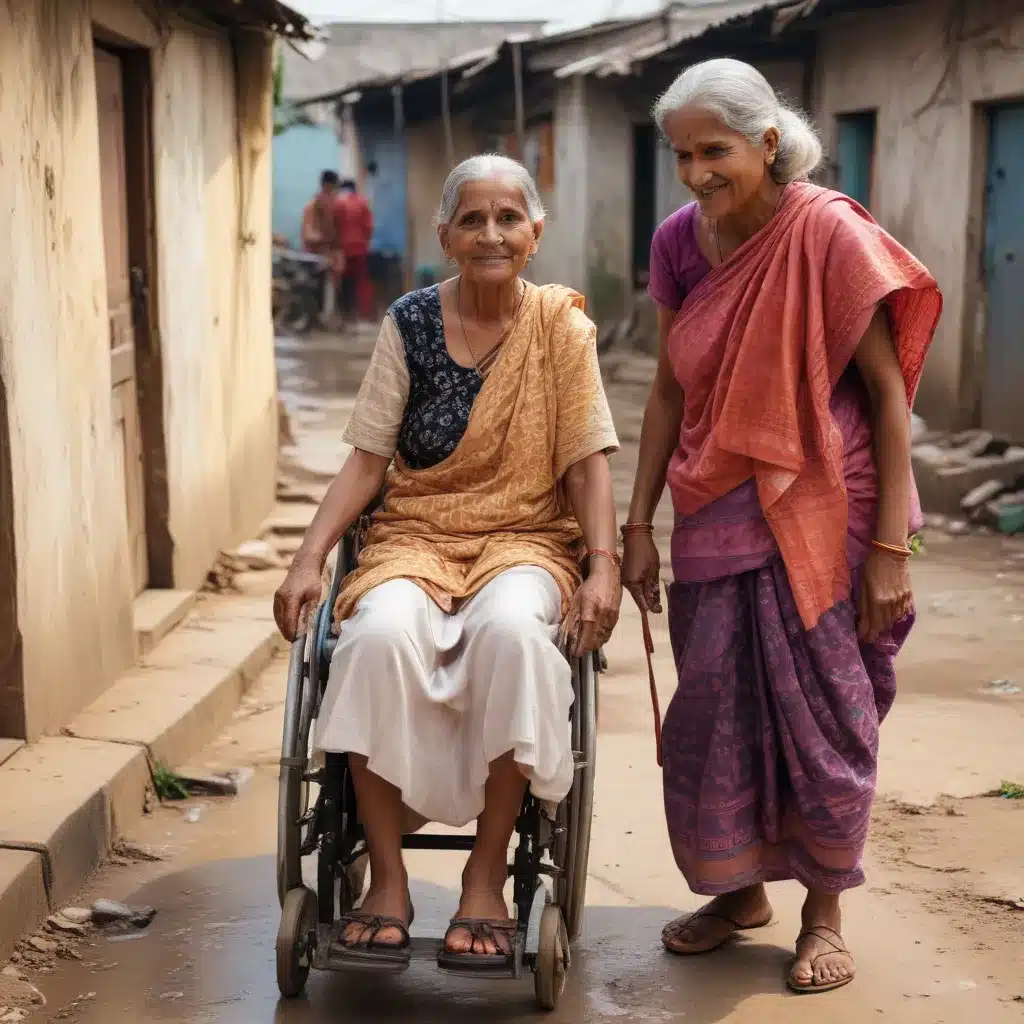
Understanding the Complexity of WASH Access for Vulnerable Groups
Ensuring equitable access to water, sanitation, and hygiene (WASH) services is a critical challenge facing many informal urban settlements worldwide. However, the unique needs of marginalized groups such as the elderly and persons with disabilities are often overlooked in WASH planning and interventions. In Hyderabad’s sprawling informal settlements, these vulnerable populations face compounded barriers to accessing essential WASH facilities and services.
The Elderly’s WASH Struggles
Older residents in Hyderabad’s informal communities confront a range of complex obstacles. Many elderly individuals live in isolated conditions, lacking strong social support networks to assist with daily tasks like fetching water or using sanitation facilities. Declining physical and cognitive abilities further compound these challenges, rendering simple WASH activities laborious or even dangerous. Inadequate or inaccessible WASH infrastructure in the settlements, such as water pumps placed at heights unsuitable for the elderly, forces older persons to rely on younger family members or neighbors for help – a burden that can strain social ties.
Accessing WASH for Persons with Disabilities
Persons with physical, sensory, or intellectual disabilities face unique WASH-related hurdles in Hyderabad’s informal settlements. The built environment is often highly inaccessible, with steps, narrow doorways, and uneven terrain obstructing wheelchair users or those with mobility limitations. Public toilet facilities frequently lack the necessary accommodations like grab bars, ramps, or wide stalls. Lack of awareness and negative societal attitudes compound the challenges, with disabled individuals sometimes prevented from using communal WASH facilities due to stigma or discrimination.
Bridging the WASH Access Gap through Formal-Informal Collaboration
Addressing these multifaceted WASH challenges for the elderly and persons with disabilities in Hyderabad’s informal communities will require a comprehensive, collaborative approach that harnesses the strengths of both formal and informal support systems.
Leveraging Informal Community Networks
Informal actors, such as local community groups, religious institutions, and individual neighbors, often play a vital role in supporting vulnerable populations in informal settlements. These networks possess invaluable contextual knowledge and can identify the unique WASH needs of the elderly and disabled residents. Tapping into these informal support structures can enable more tailored, community-driven solutions, such as establishing volunteer-led water collection and distribution services or organizing peer-to-peer training on assistive WASH technologies.
Formalizing WASH Service Delivery
While informal community networks are essential, formal actors and institutions must also be engaged to address the systemic challenges of WASH access in informal settlements. Local governments, utility providers, and development agencies can play a crucial role in ensuring that WASH infrastructure and service delivery are designed with the needs of the elderly and persons with disabilities in mind. This may involve mandating accessibility standards, providing targeted subsidies or assistive devices, and fostering collaborative partnerships with community-based organizations.
Amplifying Voices of the Vulnerable
Amplifying the voices and lived experiences of elderly and disabled residents is crucial for driving meaningful change. Integrating these marginalized groups into WASH decision-making processes, through mechanisms such as community advisory boards or participatory planning workshops, can help ensure that interventions are truly responsive to their unique needs. Additionally, empowering these vulnerable populations with knowledge and advocacy skills can enable them to effectively engage with both formal and informal actors, claiming their rights to equitable WASH services.
Innovative WASH Solutions for the Elderly and Persons with Disabilities
Across Hyderabad’s informal settlements, a growing number of innovative, collaborative initiatives are emerging to address the WASH challenges faced by the elderly and persons with disabilities.
Accessible WASH Infrastructure
One such initiative involves the co-design and installation of adapted WASH facilities, including wheelchair-friendly public toilets, water taps positioned at accessible heights, and tactile signage for the visually impaired. These collaborative efforts, involving local authorities, community groups, and disabled persons’ organizations, have proven successful in enhancing the usability and safety of WASH infrastructure for vulnerable populations.
Assistive WASH Technologies
Complementing physical infrastructure upgrades, the introduction of assistive WASH technologies has empowered elderly and disabled residents to manage their daily WASH needs more independently. For instance, the distribution of portable water filters, foldable commodes, and manual pumps has enabled these groups to access clean water and sanitation without relying solely on others. Hands-on training sessions, facilitated by both formal and informal actors, have been crucial for building the confidence and skills of users.
WASH-Inclusive Emergency Response
The COVID-19 pandemic has further highlighted the importance of integrating the needs of the elderly and persons with disabilities into emergency WASH preparedness and response. In Hyderabad, community-based organizations have collaborated with local government agencies to ensure that vital hygiene supplies, such as soap and hand sanitizer, are equitably distributed, and that WASH facilities in temporary shelters are accessible to all. These inclusive emergency WASH initiatives have helped protect the most vulnerable from the devastating impacts of the pandemic.
Toward an Inclusive WASH Future
By fostering complementary partnerships between formal institutions and informal community networks, Hyderabad’s informal settlements are making strides in addressing the unique WASH needs of the elderly and persons with disabilities. Through co-designed infrastructure, assistive technologies, and inclusive emergency response, these collaborative efforts are empowering marginalized groups and paving the way for a more equitable WASH future.
However, much work remains to be done. Sustained commitment from all stakeholders, including local authorities, service providers, civil society organizations, and the vulnerable populations themselves, is crucial for scaling up these innovative WASH solutions and ensuring their long-term sustainability. Only by amplifying the voices of the elderly and persons with disabilities, and weaving their perspectives into the fabric of WASH planning and implementation, can we truly achieve universal access to these essential services.
The Joint Action for Water blog is proud to highlight the transformative WASH initiatives unfolding in Hyderabad’s informal settlements, offering valuable lessons for other urban centers grappling with the challenge of marginalized group inclusion. Through continued collaboration and a steadfast commitment to equity, the path toward a more inclusive WASH future lies ahead.

